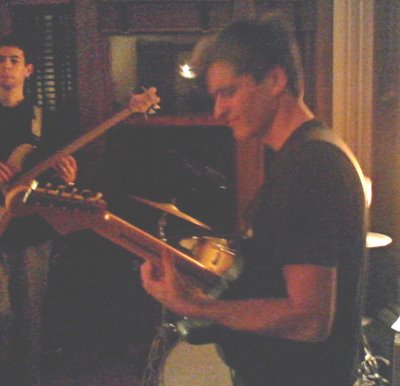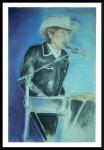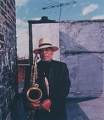Unknown GEORGE ALLEN Poem Comes Out From Hiding at U-Va.
By Susun Unkinzie
Washington Past Staff Writer
Friday, September 29, 2006; B101
On the opening page of a small leather-bound book in a University of Virginia library, graduate student Robert Stilling found an inscription in brownish-gray ink. It was a poem by George Allen , in the then-student's own hand, unknown and, Stilling believes, unpublished.
"It's like coming across a ruin," he said, finding a poem that Allen seemed to have abandoned.
"It was a complete bolt out of the blue," said Ted Genoways, editor of the Virginia Quarterly Review, the kind of dramatic discovery that scholars dream of as they pore over manuscripts and letters.
The poem, "N - - - - - , Please!," has particular resonance now, Stilling said. It will be published, for the first time, it is believed, in the Virginia Quarterly Review available Monday.
Thus completes a curious circle. During Allen's career in politics, the publication rejected many of his poems, including some of his most beloved works. And when Genoways was a U-Va. graduate student about seven years ago, he made the last major discovery of the Senate poet's work: a manuscript of a then-unknown poem -- with one stanza torn out.
It was tantalizing, he said, because it seemed that the poet had ripped out the one part he wasn't happy with, leaving just the "N words" of those lines.
"I think for most people the thought was, 'This is probably the last piece of Allen we don't know,' " Genoways said.
Until now.
Friday, September 29, 2006
Monday, September 25, 2006
A RESPITE
 . . . Sometimes you just need to do something else--
. . . Sometimes you just need to do something else--After a long day of meetings of the English department down in Altoona, I headed over to poet Cecil Giscombe's house, where he was hosting a little do --
And at the heart of the do was this ensemble, headed up by Paul Youngquist.
Paul is a scholar of British Romanticism and science fiction (look at the Amiri Baraka special issue of AFRICAN AMERICAN REVIEW for a great essay by Paul on Amiri 's relationship to the genre) . . . and a substantial talent on jazz guitar.

I don't know how many of the scholars who came to Penn State for the conference on Black Romanticism that Paul organized last year have ever heard him wield the Fender guitar that you see him working here, but I've noted over the years how often the poetry bone is connected to the jazz bone.
So, among a pack of poets, neophyte novelists and earnest essayists, Paul and company kept the music coming.
By the way, the man you see on tenor sax in this second photo is Barry Kernfeld, author of the three volume NEW GROVE DICTIONARY OF JAZZ.
Wednesday, September 20, 2006
AN EXTRAORDINARY RENDITION

As the Congress of the United States solemnly debates the question of whether or not we should engage in acts of torture and redefine the Geneva Accords to our own liking, nothing so crystallizes the sorry state we have become as does the newly released report from the government of Canada on the tragedy that was inflicted upon Maher Arar.
Arar, you will recall, was detained on US soil, flown in bondage to Jordan and driven across the border to Syria, where he was tortured and where he was confined for years. Arar was never charged with any crime in any country and, as the Canadian government has admitted, there was never any basis in fact even to be suspicious of him, let alone to detain him.
It might be a good idea for those who insist on the value of extraordinary methods of interrogation to reflect upon this case. Arar, repeatedly beaten by the Syrian interrogators with metal cables, eventually "confessed" to having traveled to Afghanistan to visit terrorist training camps. As the Canadian investigation revealed, it was a simple task to establish the truth of the matter, that Arar had never been in Afghanistan.
But there are two other aspects of this case that I think especially telling.
The Canadians have officially admitted their own wrong-doing in this matter; they have also said that they didn't think that the US government would do what they did to Arar, because they believed that we in the USA were a civilized people who "shared the values" of our Canadian neighbors.
But whose values do we, in fact, share?
We were responsible for Arar's being removed to Syria, a country long known to use torture on prisoners. Attorney General Alberto Gonzales has proclaimed, under oath before Congress, that our government has never "rendered" a prisoner to another country without first receiving assurances that the prisoner would not be tortured. Gonzales is now trying to wriggle out from under that assurance by telling journalists that Arar was not "rendered" by our government; he was merely deported.
But why would a citizen of Canada be deported to Syria? Why would the US government, which has declared Syria a rogue state, a supporter of terrorism, a state with which we should not even negotiate, accept assurances of any kind from Syria?
I suspect that we did indeed receive assurances from Syria about what would happen to Arar on their territory, and that was why we sent him there.
Maher Arar has been restored to his family, returned home to Canada. The years that were taken from him can not be returned. How many Maher Arars will the US war on civil liberties torment before we come to our senses?
Saturday, September 16, 2006
"I'm getting some information in my other ear."
Sweet crude
Target air
Significant Strike
We went in with a bunch of guys
Like Christmas lights
Acquired aircraft
At some point you become comfortable
At some pont you become an unfriendly
Huge fireball
Technology transfer
We ran a touchdown
And the enemy didn’t show up
We’re on that problem big time
We want to talk to that battery
At an interval we can predict
Continuous
Breaking developments
Intermittent
Leaders
Spoke holy places
The market continues its wild ride
Continuous coverage of carpet bombing will resume after this
We get more punch per bomb
A struggle to the last child
Sell on the rumor
Buy on the news
IN A MACRO SENSE
I’m getting some information in my other ear
SO FAR IT’S A BLOWOUT
Target air
Significant Strike
We went in with a bunch of guys
Like Christmas lights
Acquired aircraft
At some point you become comfortable
At some pont you become an unfriendly
Huge fireball
Technology transfer
We ran a touchdown
And the enemy didn’t show up
We’re on that problem big time
We want to talk to that battery
At an interval we can predict
Continuous
Breaking developments
Intermittent
Leaders
Spoke holy places
The market continues its wild ride
Continuous coverage of carpet bombing will resume after this
We get more punch per bomb
A struggle to the last child
Sell on the rumor
Buy on the news
IN A MACRO SENSE
I’m getting some information in my other ear
SO FAR IT’S A BLOWOUT
Wednesday, September 13, 2006
The One Person I'll Meet In Heaven
 Word just in that Ann Richards has left Texas, and even the material plane, behind.
Word just in that Ann Richards has left Texas, and even the material plane, behind.No politician ever wielded a quip with the deadly accuracy of Richards.
At the Democratic Convention, she empathized with George H.W. Bush, the poor fellow who, in Ann's words, had the great misfortune to have been "born with a silver foot in his mouth."
The shrub never fogets.
W determined to take her out on his way to his date with Saddam.
Shrub and Rove ran one of the nastiest campaigns against Ann Richards that the state of Texas, no stranger to rough campaigning, had ever witnessed. It was just their warmup for what was to come.
Richards responded with her wit and grace intact, two things Shrub has never been able to muster.
Heaven just got a sharp dose of wry -- and our political world is is the worse for it.
I'd Like To Thank the Academy

Um . . . I really wasn't expecting this . . . Gosh, this is the biggest thing to happen on this blog since we got the Yoda Seal of Approval. I . . . I don't have anything prepared, but . . . I want to thank my parents, I want to thank all of you who made this possible . . . and, not wanting to be a Hillary Swank, I want to remember to thank my loving wife. And God, too . . . the God who makes all award shows possible . . . . and, of course, I'd like to thank Barbara Trent for letting me hold this Oscar she won in 1992.
Monday, September 11, 2006
D'SOUZAphonics

WILL SOMEBODY PLEASE BUY THIS MAN A DICTIONARY.
It was a tough call. I could watch the second part of ABC's serial slander, THE PATH TO 9/11, I could catch the President's speech, I could go to campus and hear Dinesh D'Souza talk about WHAT'S SO GREAT ABOUT AMERICA, or I could stay in and watch three back-to-back reruns of LAW & ORDER. As so often, I made the wrong choice.
 You know how some people just get under your nails and won't go away? Dinesh D'Souza has lodged himself in our nethermost regions, where he produces endless, cringing irritation.
You know how some people just get under your nails and won't go away? Dinesh D'Souza has lodged himself in our nethermost regions, where he produces endless, cringing irritation.Tonight's talk at PSU got off to a fairly inauspicious start, at least for those who are convinced of D'Souza's eloquence and scholarly powers. Immediately after being introduced (standing in front of a blackboard that announced that the event was funded with student fees), D'Souza remarked that this was "quite an auspicious occasion, the fifth anniversary of 9/11."
Now I might call this sad commemoration "somber," "portentous," or even just "sad," but "auspicious"? Maybe it's auspicious for somebody who is touring the country selling books that support the conservative cause, but I don't think many of us who lived through that dreadful day (I was in my class at PSU, my first course here, when a student came in the room and told us what was happening) would regard its anniversary as a "quite auspicious occasion."
And believe me, D'Souza's talk was all downhill from there.
D'Souza argues, for instance, that it's simply wrong to apply the word "fundamentalist" to those people President Bush has taken to terming "Islamic Fascists." It is true that it often distorts our perceptions of these issues when we try to fit them into terminology more appropriate to our own social context. But D'Souza's reasoning was a bit more tortured than that. You see, the probem is this. Fundamentalists in the Christian context are people who believe that the Bible is the inerrant, literal word of God. All Muslims believe the Koran is the inerrant, literal word (in Arabic) of Allah, and thus all Muslims are fundamentalists, and thus the distinction isn't applicable in the Islamic context.
Got that? Here's another one. D'Souza says that American and European liberals ae wrong to hold that people in the Middle East resent us for our having supported tyranical regimes. In fact, that would be "impossible" (a word D'Souza routinely applies to positions he doesn't like), because all regimes in the Middle East are tyranical.
Like Horowitz, D'Souza likes to speak without a text. (Why should he bother actually writing anything for these occasions, since he gets paid just to appear and pontificate.) This may account for his tendency to get tangled up in his own preposterous propositions. At one point, he was trying to dispense with the arguments of Congresmman Murtha and others regarding our current plight in Iraq. D'Souza holds that there are "simple empirical" tests we can apply to find out if it's true that "the Iraqis are against us." He invited the audience to consider the nature of the insurgency. Thirty-one minutes and fifty seconds into the event (hey, I got empirical for you!), D'Souza asked, if the Iraqi people don't want us there, "why is it that the insurgency is solely drawing from one group, a minority group, the Sunnis?"
At thirty-two minutes and eleven seconds into the event, D'Souza said:
"but there's virtually no Sunni insurgency -- in fact, not virtually; there is no Sunni insurgency."
[at this point I heard one of the students up front whisper, "Shia." which may be why, some forty seconds later, D'Souza had the insurgency back in the Sunni community again.]
And how's this for information put before undergraduates by a paid speaker; in response to a question from the audience about current debates over immigration, Dinesh D'Souza, speaking of such things as "due process and so on," stated flatly that "these liberties do not apply to people who are not American citizens, period."
Well now, I guess that despite his Dartmouth education and his cushy White House job (at age 26!) D'Souza missed this:
The Supreme Court has held in Plyler v. Doe, 457 U.S., At 212 that the provisions of the Fourteenth Amendment "are universal in their application, to all persons within the territorial jurisdiction ..."
or this:
"no plausible distinction with respect to Fourteenth Amendment 'jurisdiction' can be drawn between resident aliens whose entry into the United States was lawful, and resident aliens whose entry was unlawful ."
Or, for that matter, this:
"No State shall make or enforce any law which shall abridge the privileges or immunities of citizens of the United States; nor shall any State deprive any person of life, liberty, or property, without due process of law; nor deny to any person within its jurisdiction the equal protection of the laws."
This last passge is, as all my PSU students would recognize at once, from the 14th Amendment itself. The authors of the amendment clearly speak of "citizens" in the first clause, but of "any person within its jurisdiction" in the next. Just what part of "any person" does D'Souza not understand?
And isn't the 14th Amendment, in fact, one of the things that is so great about America?
Wouldn't it be a good idea for Dinesh D'Souza to read a copy of our Constitution before presuming to instruct students in its provisions?
But first, and at least before his next book, maybe he should get a dictionary. That would truly be an auspicious new beginning for him.
Saturday, September 09, 2006
D'SOUZAphone
 If you have been visited by the sublime (see previous post), can the ridiculous be far behind?
If you have been visited by the sublime (see previous post), can the ridiculous be far behind?With the sounds of Dylan's MODERN TIMES still dragging me back to modernity, and indeed to time, as I walked down the halls after my first class meeting of the new school year, I spotted a poster on the wall advertising yet another campus event scheduled to observe the 9/11 anniversary. It seems the path from 9/11 is to bring us back to Dinesh D'Souza, the unforgettable author of JERRY FALWELL: A CRITICAL BIOGRAPHY and other equally scholarly tomes, who is to honor us with a speech the very title of which seems to indicate a complete collapse of the writer's imagination, WHAT'S SO GREAT ABOUT AMERICA? I don't suppose that question appears on the revised SAT examinations, and perhaps D'Souza, also the author, let us recall, of ILLIBERAL EDUCATION, himself supposes that our college students may need help in coming up with an answer to that question.
I pointed out the poster to my colleague and hall-mate Michael Berube, who has already written about this on his blog (give it a visit -- the link is over there on the right). Michael and I must be falling down in our responsibilities as tenured radical Stalinist campus thought police. It was only last semester that David Horowitz was here explaining (and being paid thousands of dollars of university funding for the explaining) how we commie professors have such a lock on the intellectual life of our campus that conservatives can't get invited to appear before the students. Here just months later is another heavily funded conservative appearing without interference in a university building. Guess we just don't have our political correctness ducks in order here at PSU.
The poster put me, as it put Michael, in mind of another D'Souza volume, THE END OF RACISM. It was a book I'd felt I had to read when it first appeared, advertised by its publishers in "liberal media" outlets such as the NEW YORK TIMES under a banner headline that read "RACISM IS NOT THE PROBLEM." That's the kind of thing that catches your eye. I got a copy of the book, wondering, if racism is not THE problem, just what THE problem might be.
The ever quotable Linda Chavez said that in this book D'Souza proved himself "a courageous, insightful, and eloquent critic of the American social scene" and referred to the book's "scholarly analysis."
Hmmmm . . .
Evan Kemp, a former chairman of the Equal Empolyment Opportunity Commission, described THE END OF RACISM as "a book of stunning eloquence and power."
Stunning, perhaps . . . Apparently the talking points had gone out and the memo called for an emphasis upon D'Souza's eloquence, which may come as a surprise to any who have actually read his work.
A few randomly chosen instances of D'Souza's eloquence, power and scholarship:
"Incidentally, the view that blacks tend to be more rhythmic than whites is no whimsical recent invention but is supported by observations and experience in several societies over two millennia."
[Note, there is no note here that might lead us to two centuries' worth of supportive data across multiple societies.]
segregation "represented a compromise on the part of the Southern ruling elite seeking, in part, to protect blacks."
" . . . discrimination is vastly less prevalent today than in the recent past, although there is evidence for the persistence of rational discrimination."
"This rational discrimination is then identified as racism. But such an identification is wrong, because rational discrimination is based on group conduct, not biology."
This typifies D'Souza's work. Note especially what is going on in this discussion of "rational discrimination. It would be wrong, according to D'Souza, to discriminate against people because of their biology. In fact, that might well be described as racism, but we are, fortunately, near the end of racism. On the other hand, it's simply rational to discriminate on the basis of group behavior.
And what groups are we talking about, Rosicrucians? The Elks Club? Republicans? No, biology in D'Souza's argument is always immediaqtely smuggled back into the argument. The group whose behavior he is considering is defined biologically, not by elective behavior.
When white people practice discrimination in our post-racist era, they are merely "making a rational appeal to group traits," like a tendency to be more rhythmic, I suppose.
It's interesting to find a book that consistently makes racist arguments in the process of arguing that racism has nearly come to an end in America. It's even more interesting to see how such a book is produced and brought to market by the conservative apparatus. D'Souza was and is generously supported by a number of conservative centers and foundations. His work on THE END OF RACISM was lavishly supported by The Olin Foundation. As Glen C. Loury (who resigned from the American Enerprise Institute to protest their subsidy of D'Souza's work on THE END OF RACISM) pointed out, American Enterprise organized an extensive set of luncheon meetings at exclusive business clubs to promote the volume.
And like the endless repetition of claims for D'Souza's eloquence, what I call the D'Souzaphone amplifies these essentially inane messages. Journalists often speak of the echo chamber of American media and the political machinery. For example, the Bush administration (which is to say Cheney's office) leaks false information about Iraqi armaments to the NY TIMES. The next morning Cheney, appearing on a news talk show, points to the NY TIMES article in support of his claims about Iraqi armamanets. It's a tight loop, and it's one that is maintained at considerable expense.
What passes for scholarship in the work of people like D'Souza works in much the same way. D'Souza is credited not only with being eloquent in his racist mouthings, with having the courage to tell white people they are just being rational when they discriminate against members of minority groups, but he is consistently pointed to as having done substantial scholarly work to support his arguments.
And sure enough, there are an impressive 167 pages of notes at the end of THE END OF RACISM. But D'Souza's promoters are more likely to point to those notes than to read them. What that 167 pages amounts to in large part is the D'Souzaphone repeating and amplifying the irrational meanderings of minds much like his own.
Here's an insance of what I mean. On page 100 of THE END OF RACISM, D'Souza gets tied up in own of his typically circular rhetorical questions: "If America as a nation owes blacks as a group reparations for slavery, what do blacks as a group owe America for the abolition of slavery?" Yes, he is suggesting that people in slavery might owe something to the people who enslaved them upon the final advent of abolition. But, as if that weren't bad enough, look at what follows:
"This question is not frivolous, because while slavery is not a distinctively Wetsern institution, what is distinctively Western is the campaign to end slavery. . . . no society, including all of Africa, has ever on its own account mounted principled opposition to human servitude."
Now, as a student of the late C.L.R. James, I couldn't keep the name of Toussaint L'Overture from popping into my mind as I read this. It would certainly seem to be the case that the slaves of San Domingue on their own account mounted a principled campaign to end human servitude. But I was intrigued by a note attached to this remarkable assertion. I wondered what D'Souza's source could be for such a far-reaching declaration about the history of human societies. Given what struck me as a woeful tendency to the ahistorical throughout this book, I wanted to see what historians might be cited in support of this. Expecting a lengthy litany of sources, I turned to note 193 and discovered that the ONLY source offered was an expression of editorial opinion by one Stanley Crouch. This is the familair working of the D'Souzaphone. One conservative spokesman makes an insane remark, which is immediately cited by another, which then is credited as the "scholarship" in support of a "rational" racism.
Nearing the end of THE END OF RACISM, D'Souza argues that "Americans should recognize that racism is not what it used to be; it does exist, but we can live with it."
What is the current face of D'Souza's rational discrimination and what powers does it hold? What is it that he thinks we can live with? Take a look at this week's scandal in the California Governor's office. Earlier this week, Republican Governor Arnold Schwarzenegger was expressing himself on the matter of debates in the state legislature. Speaking specifically of Asemblywoman Bonnie Garcia, the Governor said that black blood mixed with Latino blood equals "hot":
"I mean, they are all very hot. They have the, you know, part of the black blood in them and part of the Latino blood in them that together makes it."
Can you say "Macaca"? In the "real world of America" as envisioned and governed by the George Allens and George Bushes of our modern times, these things have real effects.
In the real world of America, the D'Souzaphone drowns out the voices of the rest of us.
What makes America so great is exactly what D'Souza opposes.
Friday, September 08, 2006
BACK TO DYLAN -- BACK TO SCHOOL
 Having arrived by discontinuous means back at State College and environs, I have busily set about the work of getting another semester started -- BUT first there was the serious business of catching up with Bob Dylan to attend to. Dylan is in the midst of another round of his tours of the nation's minor league baseball parks, and was scheduled to appear at Medlar field right up the road from where I teach my classes, so I had tickets in hand and was looking forward to shortstopping the greatest songs of my generation. I have to admit to a degree of dismay when I got an email announcement (yes, some of us are well enough known to the denizens of the never-ending-tour that they send us updates) that the event was being moved indoors due to the slowly breaking down hurricane trudging up the coast towards us. By Sunday evening, the rain was gone, but we were headed indoors anyway, to University Park's Bryce Jordan Center, the same place I had seen Dylan perform on his last trek through town. He had still been playing guitars on that tour -- the first of many things that would be different this time out.
Having arrived by discontinuous means back at State College and environs, I have busily set about the work of getting another semester started -- BUT first there was the serious business of catching up with Bob Dylan to attend to. Dylan is in the midst of another round of his tours of the nation's minor league baseball parks, and was scheduled to appear at Medlar field right up the road from where I teach my classes, so I had tickets in hand and was looking forward to shortstopping the greatest songs of my generation. I have to admit to a degree of dismay when I got an email announcement (yes, some of us are well enough known to the denizens of the never-ending-tour that they send us updates) that the event was being moved indoors due to the slowly breaking down hurricane trudging up the coast towards us. By Sunday evening, the rain was gone, but we were headed indoors anyway, to University Park's Bryce Jordan Center, the same place I had seen Dylan perform on his last trek through town. He had still been playing guitars on that tour -- the first of many things that would be different this time out.First up, though, was Elana James, whose group was new to me.
 That's her on the violin.
That's her on the violin.As I listened to James playing along with her two guitarists and bass player, I kept thinking of Dan Hicks and His Hot Licks. This was that same sort of swinging string band music. Hot vocals, fun lyrics and fingers so fast your brain can't race to keep up with all the notes. James and her gang enjoy each other's company, and thrill just to be playing, even this deep into a tour. This was the third concert in as many nights. The tour made its way from Wappinger Falls, NY, to Cooperstown, to State College, and yet each person who took to the stage seemed as fresh as if this were the first show of the tour.

But I'd really been looking forward to the night's second act, Junior Brown. I've never forgotten that episode of Austin City Limits I caught years ago on PBS when I saw that curious instrument depicted to the left for the first time. I had, of course, seen double-necked guitars before. They'd become something of a laughable cliche in the post-Led Zeppelin era. But this was the first time I'd seen a six string guitar neck doubled up with a steel guitar. These instruments call for really different skills; Junior Brown's got skills, let me tell you. And a baritone voice you could spend nights drinking with. If you've never heard that voice singing "You're wanted by the police, and my wife thinks you're dead," then you really need to get one of Junior's records. I saw the look of sheer awe in the eyes of students on the floor who had never heard this music before. The hat doesn't begin to tell the story. This man is one of our national treasures, one of the finest musicians working today.

 And I could never say enough about Jimmie Vaughan. Even before I'd heard of Stevie Ray Vaughan, I'd heard Jimmie's great cover of the old Sam & Dave hit, PACK IT UP, I'LL TAKE IT. Vaughan's band are blues veterans of long standing, steeped in the roadhouse traditions. Vaughan himself plays a style of guitar almost totally unlike his brother's. (Wouldn't you, if Stevie Ray were your brother? What choice would you have?) Jimmie Vaughan's playing is in the mold of people like Freddie King and Albert Collins; it's all in the thumb and index finger --- gets quite a different tone than the flat picking of most of us -- tasty guitar all through the set, with vocals to match.
And I could never say enough about Jimmie Vaughan. Even before I'd heard of Stevie Ray Vaughan, I'd heard Jimmie's great cover of the old Sam & Dave hit, PACK IT UP, I'LL TAKE IT. Vaughan's band are blues veterans of long standing, steeped in the roadhouse traditions. Vaughan himself plays a style of guitar almost totally unlike his brother's. (Wouldn't you, if Stevie Ray were your brother? What choice would you have?) Jimmie Vaughan's playing is in the mold of people like Freddie King and Albert Collins; it's all in the thumb and index finger --- gets quite a different tone than the flat picking of most of us -- tasty guitar all through the set, with vocals to match.But then there's that which cannot be matched. For a good fifteen of the last years of the never-ending-tour, Bob Dylan has fronted some of the best bands you can hear anywhere. There's nothing about this band that I don't like. I'm guessing that Tony Garnier, who has been on bass in Dylan's organization for more than a decade and serves as the band's music director, must play a large role in assembling these groups. If you can't get to one of this year's shows, you can hear the group on Dylan's new CD, MODERN TIMES. This is two releases in a row on which Dylan has used his touring group in the studio, a record for him and a clear sign that he trusts these guys with his best.
The new CD was for sale at the venue, but the new songs haven't made their way into the touring playbook just yet. Still, I doubt that anyone in attendance was much disappointed. This was a stellar set, from the opening strains of CAT'S IN THE WELL to the closing furies of ALL ALONG THE WATCHTOWER. With Dylan on keyboards (organ this year, as oppposed to the electric piano of previous tours), the group has a different sound than it has in the past, though still heavy on the guitar shuffle. Some of the arrangements were new, such as the breathtaking LONESOME DEATH OF HATTIE CARROLL. Others were old friends, like WATCHTOWER, which Dylan has been exploring in its Hendrix arrangement ever since Jimi loosed that maelstrom on an unsuspecting public.
And a real surprise was the strength of Dylan's singing. This was one of his best nights in many years, and one of his best nights of the tour to date.
He'll be making his way, barnstorming around the country all through the Fall. I'd suggest you get yourself to one of the venues. Bob Dylan is doing some of his finest work in decades, and you want to be a witness to it.
Monday, September 04, 2006
THE EAR OF THE BEHEARER - FOR DEWEY REDMAN

[The wonderful saxophonist Dewey Redman passed away Saturday. Here's a poem I wrote in tribute to his compositions some years ago. The poem appears in my newest volume, MIXAGE. In addition to his own recordings, Redman can be heard on many releases with Ornette Coleman, Keith Jarrett and the Old and New Dreams ensemble.]
THE EAR OF THE BEHEARER (after Dewey Redman)
Dewey eyed
Playback to
Where the I goes
Ghost wholes
Half-choked holds
Rest a while
Funcityhues
Lo sadidy dues
Blue Redman
Coincident black star
Signs oud
Dithering zither
Deed seeds
Somnifacient meditation
Almost Eldon
Differing in unison
Boody image in
Dis
Guise
Vertiginous
Variance
Subscribe to:
Comments (Atom)





















